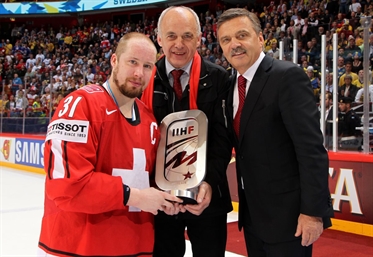A whole new world?
A whole new world?
As 2013 shows, underdog nations must be taken seriously

 Although losing to Sweden in the final hurt, Swiss captain Mathias Seger (with Swiss President Ueli Maurer, IIHF President René Fasel) and his team proved their country is a true hockey nation. Photo: Andre Ringuette /HHOF-IIHF Images
Although losing to Sweden in the final hurt, Swiss captain Mathias Seger (with Swiss President Ueli Maurer, IIHF President René Fasel) and his team proved their country is a true hockey nation. Photo: Andre Ringuette /HHOF-IIHF Images
Switzerland’s amazing run to the silver medal was the most prominent example of the ever-increasing parity in international hockey. Even the underdog hockey nations are enjoying success.
Relying on great teamwork, the Swiss won nine straight games. Before losing 5-1 to Sweden in the final, they gave up just one point in a 3-2 shootout victory versus the Canadians.
You can reasonably argue that this result means there are now eight – not seven – international hockey powers: the Canadians, the Czechs, the Finns, the Russians, the Slovaks, the Swedes, the Americans... and the Swiss.
“Can you imagine if the Swiss won the World Championship?” said Canadian hockey legend Paul Henderson, who scored the winning goal in Game Eight of the 1972 Summit Series against the Soviet Union. “That’s a wake-up call for the whole world. I mean, it’s unbelievable. They don’t have great stars out there, but they’re an incredible team.”
This was Switzerland’s first appearance on the podium since winning bronze in 1953. Its only previous silver medal came in 1935.
It didn’t come completely out of the blue. The Swiss have been making steady progress with their development programs since returning to the top division of the IIHF World Championship in 1998.
Still, with all due respect to Detroit’s Damien Brunner, they still lack an elite NHL forward comparable to, say, Austria’s Thomas Vanek or Slovenia’s Anze Kopitar. And last year, the Sean Simpson-coached squad came eleventh, marking their worst finish in 15 years.
Continue readingSo Switzerland’s machine-like efficiency, with relentless checking, excellent defensive positioning, and an ability to outskate and outscore opponents in Stockholm did come as a surprise.
But it just proves that you have to be ready for anything nowadays. There is zero room for complacence or entitlement in modern international hockey.
Who would have believed that Slovenia – a country with about 140 registered senior players – could take a Canadian team with Steven Stamkos, Eric Staal and Claude Giroux to overtime before losing 4-3?
Did Canada have all its best players there? No. Did Slovenia have its very best player there in Anze Kopitar? No. Slovenia would love to have Canada’s problems when it comes to roster selection.
Will we look back on France’s shocking 2-1 victory over Russia as the turning point that set Russian coach Zinetula Bilyaletdinov’s ship permanently off course in the journey to gold in Sochi? Or will it prove to be the wake-up call the Russians needed to emerge victorious on home ice in February?
One thing is for sure: after falling to Les Bleus, Russia never again resembled the team that had won 10 straight games en route to gold in Helsinki last year.
Perhaps the most shocking result of all was the 8-3 American win over the Russians in the quarter-final. It wasn’t the mere fact that the Americans won. On any given day, any team can now beat another at the elite level. And the Americans had an NHL-dominated roster that included 2010 Olympians Paul Stastny and Erik Johnson – although in fairness, most of their players were not big names.
But for the Russians to allow eight goals was mind-boggling. It was the highest number of goals ever surrendered by Russia at an IIHF Ice Hockey World Championship, and equaled the Olympic high from an 8-5 loss to Canada at the 1960 Winter Games.
The United States – seeking its first medal since 2004 – blew superstars like Alexander Ovechkin, Ilya Kovalchuk, and Alexander Radulov right out of Hartwall Arena.
And then, naturally, those same Americans were blanked 3-0 in the semi-finals by... Switzerland. And had to settle for bronze.
What a strange and exciting new era.
That’s not to say we couldn’t be looking at another Canada-Russia or Sweden-Finland final next year.
But it’s also no stretch to believe the Swiss could make another run in the medal round when next year’s World Championship takes place in Belarus. Or maybe even in that other well-known tournament in Sochi, Russia in February.
Back to Overview











































